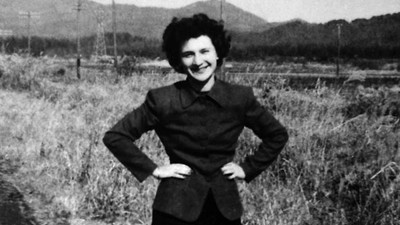貝雅特·戈登
Beate Sirota Gordon, interpreter of Japan to Americans, died on December 30th, aged 89
貝雅特·希洛塔·戈登,美國的日本翻譯官,于2012年12月30日逝世,享年89歲。
DRAFTING a constitution isn't something one does every day. It took Washington, Franklin and Co several months to achieve, that steamy summer in Philadelphia in 1787. When Beate Sirota was roped in to do it, in chilly, ruined Tokyo in the spring of 1946, she was amazed. She was no lawyer. She was 22, and only just an American citizen. Her idea of fun was going out every night. She had tagged on to General MacArthur's occupation army mostly to find her parents, whom she had left in Japan before the war. Her job, which she did very well, was to translate Japanese. But suddenly there she was, called in with two dozen men, to write—in deepest secrecy—the basic law for post-war Japan. In a week. “Beate, you're a woman,” said her colleagues. “Why don't you do the bit about women's rights?” “Wonderful, I'd love to!” she cried—and then realised she had no idea how.
起草憲法并不是一個人每天都要做的事。在1787年那個潮濕的夏日里,身處美國費城的華盛頓、富蘭克林和其他一些人耗費了數個月才完成了美國憲法的起草工作。1946年春的東京,滿目瘡痍,春寒料峭,當得知被安排加入到戰后日本國憲法的起草工作時,貝雅特感到十分吃驚。因為當時貝雅特只有22歲,也不是一名律師,僅僅是一個普通的美國公民而已。她腦海中有關樂趣的唯一概念就是每天晚上出門逛街。在日本,她一直與麥克阿瑟將軍率領的駐日占領軍生活,絕大部分時間是用在尋找二戰發生前就已經與之失散的雙親。貝雅特最擅長的工作就是將日語翻譯成英語。突然有一天,她和其他24個人被秘密地集中到一個地方,起草戰后日本國憲法。時間是一周。與她一起起草憲法的一名同事對她說:“貝雅特,作為一個女人,你為什么不去為爭取婦女的權益做點貢獻呢?”貝雅特大聲回答到,“太好了,我非常愿意去做”。可之后貝雅特才意識到她根本不知道從何做起。

She saw all too clearly, though, how women were treated in Japan. From the age of five to 15 she had lived there while her father Leo Sirota, a concert pianist from Ukraine, taught at the Imperial Academy. The land seemed enchanted to her, all exquisite gardens and cherry blossom and black-eyed, straight-haired children with whom, unusually for a Westerner, she was allowed to play. Over puppet shows and shuttlecock games she picked up the language, she claimed, in just three-and-a-half months. And she learned other things. Japanese women, for example, never came to her mother's parties. Only the men came. Japanese women would serve their husband's friends dinner, then eat alone in the kitchen. In the street they always walked three or four paces behind the men. They were usually married to men they did not know, could inherit nothing, and could even be bought and sold, like chattels.
貝雅特是十分清楚在日本國內婦女是如何被對待的。從五歲算起,貝雅特一共在日本生活了十年。他的父親,利奧·希洛塔,是一位來自烏克蘭的音樂會鋼琴演奏家,在日本帝國學院任教。貝雅特被這片土地深深地吸引,對于她這樣一位來自西方世界的人而言,精致的花園,美麗的櫻花,能夠與之一起玩耍的黑眼睛,直發的孩童,這里的一切都是不同尋常的。貝雅特聲稱,通過木偶戲和踢毽子,自己在三個半月的時間里就完全掌握了日語。除此之外,貝雅特也了解到了其他事情。比如,日本婦女從不參加自己母親的聚會。母親的聚會只有男人參加。日本的婦女在幫助自己丈夫和丈夫的朋友們享用完晚餐之后,才能一個人在廚房獨自用餐。在街上,日本婦女通常只能跟在丈夫后面三步或四步遠的地方。結婚之前,日本婦女根本不知道自己的丈夫是誰,父母死后也繼承不到任何東西,她們甚至還會像牛羊一樣被買賣。
Fired with her task, she raced in a requisitioned Jeep round Tokyo, borrowing other countries' constitutions from war-battered libraries. Rattling through them, she produced what became Article 24:
被接受的任務所激勵,貝雅特開著申請到的吉普車穿梭于東京各個飽受戰爭損害的圖書館,借閱其中其他國家的憲法。正是由于貝雅特辛勤忙碌的工作,才有了后來日本國憲法的第二十四條:
Marriage shall be based only on the mutual consent of both sexes and it shall be maintained through mutual co-operation with the equal rights of husband and wife as a basis. With regard to choice of spouse, property rights, inheritance, choice of domicile, divorce and other matters pertaining to marriage and the family, laws shall be enacted from the standpoint of individual dignity and the essential equality of the sexes.
婚姻僅以兩性的自愿結合為基礎而成立,以夫婦平等權力為根本,必須在相互協力之下予以維持。 關于選擇配偶、財產權、繼承、選擇居所、離婚以及婚姻和家庭等其他有關事項的法律,必須以個人尊嚴與兩性平等為基礎制訂之。
There was plenty more, as she warmed to her mission: women's right to paid work, to custody of children, to equal education. Much of it was stripped out, because it made the men's eyes water on the American side as much as the Japanese. A kindly colonel pointed out that she had put in far more rights than were in America's constitution. She fired back that that wasn't hard. He told her that matters like divorce did not belong there. She informed him, from long experience of trying to sort out her parents' papers with Japanese bureaucrats, that if rights were not already mentioned in a constitution they would never be written into the civil code. Then, to her huge vexation, she burst into tears.
正如她從她的使命中所感受到的溫暖那樣,日本國憲法第二十四條的內容,遠不僅僅如此:婦女享有報酬權、孩子監護權、平等接受教育權。但是,這些內容絕大部分被最終排除掉了,因為這些內容不僅會讓美國男人也會讓日本男人十分感動。一位友好的陸軍上校向貝雅特指出,她在日本國憲法中起草的有關婦女權益的內容遠遠多過了美國憲法中的有關內容。貝雅特憤怒地回答到:“這并不難做到”。上校告訴她諸如離婚此類事情不應寫進憲法中。貝雅特也義正言辭地告訴上校,基于她在日本有關官員的協助下長期收集整理父母有關材料的經歷來看,如果此類權利不被寫入憲法,那么它們就根本不可能寫入民法中。話音落下,心中的苦惱使得貝雅特眼中的熱淚奪眶而出。
The Japanese negotiators hated Article 24. But because they liked her, and because they were told that “Miss Sirota's heart is set on this” (with no word of the fact that this mere girl had also written it), they acquiesced. And so, to her astonished satisfaction, history was made. Whenever she visited Japan in later years women would cluster round to take her photograph, press her hand and thank her for her gift to them.
來自日本的談判代表十分憎惡憲法第二十四條。但因為大家都喜歡貝雅特,也因為大家都知道“希洛塔女士的心執著與此(對這僅有的女士把條款已經撰寫成的事實都不置一詞)”,他們退卻了。如此,歷史已經證明貝雅特從中得到了令人吃驚的滿足。在之后幾年中,不管貝雅特何時重回故地,日本的婦女都會簇擁向前爭相與之合影留念,握手,以表達她們對貝雅特所贈予她們的禮物的感謝。
Noh in Ohio
俄亥俄州的能劇
Looking back, she put it down mostly to luck. Luck that her father's work had taken her to Tokyo in 1929; luck that she had been allowed to absorb Japan and Japanese, but had been taught largely in American schools; luck that she had been able to get to Japan after the war, the first civilian woman to go there, and find her parents emaciated but safe; luck that MacArthur had picked her for his secret team.
回首過往,貝雅特將其中絕大部分歸因于運氣。在她看來,幸運地是,父親的工作使得父親能夠在1929年把她帶到東京;幸運地是,盡管她接受的大部分是美國教育,但她依然能夠深入到日本以及日語之中;幸運地是,在二戰后她還能回到日本,成為戰后第一批到達日本的民間婦女,并成功尋找到身心憔悴但依然健在的雙親;幸運地是,她被麥克阿瑟將軍挑選進他的秘密團隊之中。
Yet skill was involved, too. She knew she had always understood Japanese better than most people: picking up as a student in California, for example, the threats and nuances that others missed in Japan's wartime propaganda broadcasts. In peacetime, she felt bound to do whatever she could to rebuild and improve understanding of the country. From 1954, on the staff of the Japan Society, she worked tirelessly to bring Japanese masters to America, so that people in Florida or Ohio could watch the bows and sips of the tea ceremony, or the gentle koto-playing that had delighted her as a child, or the masked solemnity of Noh plays. Moving on in the 1970s to the Asia Society, she travelled the continent—braving jungles, monsoons, the breathless peaks of Tibet and seven-hour banquets in Tashkent—to bring back Javanese dancers, water puppets from Hanoi, pansori-singers from Korea.
當然,個人才能也包括在其中。貝雅特深知一直以來她比大多數普通人更了解日本:例如,作為一個在加利福尼亞州成長起來的學童,貝雅特清楚的知道在日本戰時廣播宣傳節目中存在的被其他加州人所忽略的言語之間的細微差別和威脅。在和平年代,貝雅特覺得自己有必要竭盡所能去重塑美國人對日本這個國家的認知。從1954年起,作為日本協會的工作人員,貝雅特不知疲倦地將眾多日本藝術大師介紹到美國,從而使得在佛羅里達州和俄亥俄州的人們能夠欣賞到諸如茶藝中的鞠躬和啜飲,或是在小時候讓貝雅特興奮不已的文雅的古箏表演,或是通過面具能傳達莊嚴的能劇表演。20世紀70年代貝雅特所在的日本協會演變成亞洲協會—貝雅特游歷亞洲大陸,勇敢地面對過叢林,季風,令人窒息的世界屋脊以及塔什干的七小時宴會,她為美國人民請回了爪哇的舞者,河內的水上木偶戲以及來自韓國的清唱歌手。
Immersed in all this, and aware that her post-war work had been secret, she never mentioned her constitution-drafting until 1995, when she wrote a memoir. After that, she was full of it. Yet, when all was said and done, she did not think Article 24 was the most important clause in Japan's post-war constitution. That honour, she said, belonged to Article 9, under which Japan renounced war and embraced peace. And hers was second.
貝雅特沉浸在這些工作之中的同時,對于她在戰后所從事的工作有很高的保密意識。直到1995年,貝雅特才在自己的回憶錄中提及她曾參與過日本國憲法的起草工作。在此之后,貝雅特對此感到很滿意。可無論如何,貝雅特并不認為憲法第二十四條是戰后日本國憲法中最重要的條款。在貝雅特看來,日本國憲法中最重要的條款是憲法第九條,因為在這項條款之下,日本國從此宣布放棄戰爭,擁抱和平,而她所撰寫的憲法第二十四條的重要性不能與之相比。












